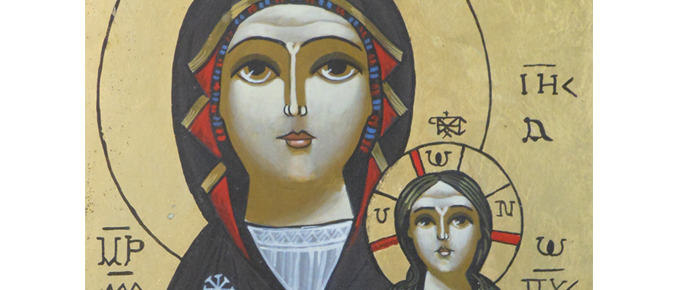
Voice and Sound of Prayer 4. Coptic Liturgical Chant

3 December, 2013
9.15 One-day seminar
As in the previous three editions (Armenian Liturgical Chant; 2010;
Oral and Written Traditions in the Byzantine Chant in Italy, 2011; and
Melkite Liturgical Chant, 2012), this year the one-day seminar in the
series “Voice and Sound of Prayer”, organised by the Intercultural Institute
for Comparative Music Studies, will again be devoted to an ecclesiastical
musical tradition from the Christian East: liturgical chant
in the Coptic church, in collaboration with Fondazione Ugo e Olga Levi Onlus, Abbazia di San Giorgio Maggiore Benedicti Claustra Onlus and Regione del Veneto.
Th e term Coptic (from the Greek [Ai]gyptos) denotes the Christians
of Egypt, united under the Patriarchate of Alexandria. Coptic liturgies
are sung in three languages: Coptic (an ancient Egyptian language
written in characters very similar to Greek script, with some
extra graphemes), Arabic and Byzantine Greek. Th e origins of this
liturgical, musical and spiritual tradition lie in the early centuries of
Christianity (from the 2nd to the 4th century). Coptic music developed
under the infl uence of various traditions: Pharaonic-Egyptian
and Demotic-Egyptian, Hebrew, Hellenistic Greek, Syriac-Christian
and Byzantine.
Today Coptic music is still transmitted orally. It is monodic, modal and involves a few instruments,
such as the triangle and cymbals. As Egon Wellesz points out, “Coptic liturgical music
today is notable for the beauty and richness of its melodies and we can claim that it reached
a high degree of perfection, especially considering that despite the persecutions meted out on
the Copts for over a thousand years, their music shows few Arabic infl uences. We can conclude
that today it still preserves the signs of a great civilisation of the past.”
Th e study day on Coptic Liturgical Chant will be attended by Egyptian and European scholars
and experts. As in the previous editions, the seminar will end with a concert.
Program
9.15-9,30
Giovanni Giuriati (Director of the Intercultural Institute of Compared Musical Studies of the “Cini Foundation” of Venice)
Greetings
9.30- 9.45
Girolamo Garofalo (Scientific and artistic responsible of the Study-Day)
Presentation of the Study-Day
9.45-10.15
Morcos Ghattas (Department of Coptic Music and Hymns – Institute of Coptic Studies, Cairo, Egypt)
An introductory overview: the Coptic Orthodox Church
10.15-11am
Michael Ghattas (Department of Coptic Music and Hymns – Institute of Coptic Studies, Cairo, Egypt)
Keynote: Coptic Music and Hymnography
11.30-12am
Ulrike-Rebekka Nieten (Vertreterin des Lehrstuhls Semitistik – Seminar für Semitistik und Arabistik, Berlin, Germany)
Coptic Church Music in Context: Interrelationships between the Syro-palestinian Realm and the Orbis Aethiopicus
12-12.30 Discussion
14-14.30
Séverine Gabry Thienpont (Centre de Recherche en Ethnomusicologie, Université Nanterre-Paris 10, France)
Music and identity: issues of the Coptic music transmission
14.30-15.00
Raimund Vogels (Studienzentrum Weltmusik – Hochschule für Musik un Theater, Hannover, Germany)
Sound archives between canon and preservation: the case of the Coptic Orthodox Patriarchate
15.30-16.00
Magdalena Kuhn (University of Leiden, The Netherlands)
Constructions and notation of Coptic melodies
16-16.30
Maria Rizzuto (University of Rome “La Sapienza”, Italy)
An audiovisual reportage of the Coptic Orthodox Holy Week in St. George Church in Rome
16.30-17
Discussion
17-17.45
Questions and answers session with Dr. Michael Ghattas and the singers of his choir, and musical demonstrations
18.30-19.45
EVENING CONCERT
Choir of “Cantor Mikhael Girgis El-Batanouny” for Coptic Music and Hymns
of the Institute of Coptic Studies of Cairo (Egypt), Director: Michael Ghattas
